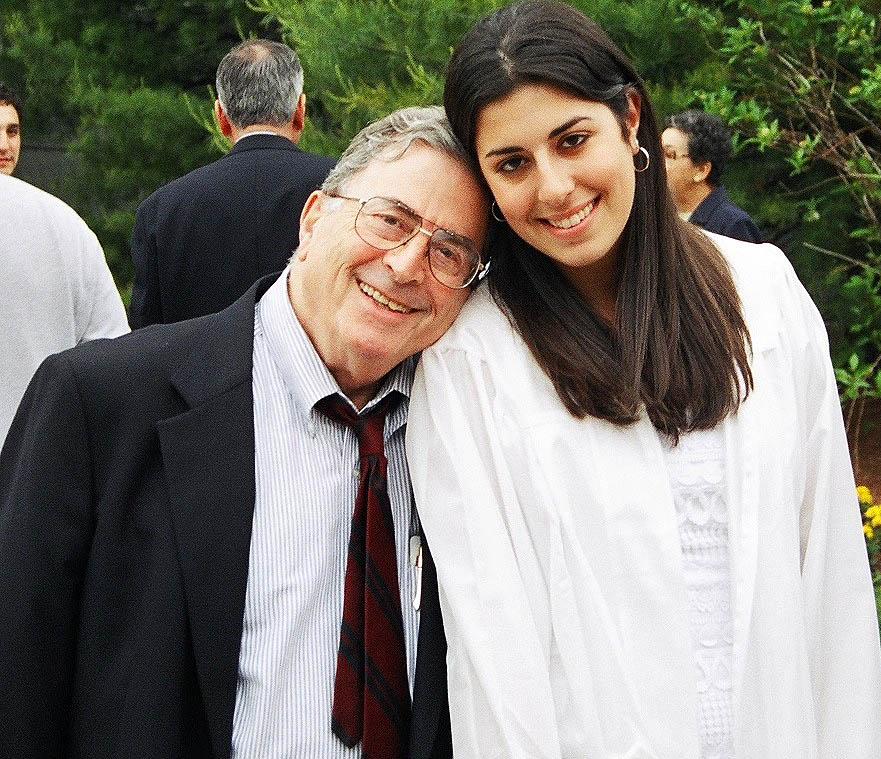• Host of U.Va. Grads Choose Service to Community and Country
Bert Sachs has a great memory for the past, but he doesn’t remember one of the most important moments of his life – his graduation ceremony at the University of Virginia School of Law.
That’s because he wasn’t there.
The retired Virginia judge, who couldn’t participate in commencement 56 years ago because of family obligations, is getting a second chance on May 18, thanks to a request made by his granddaughter, Shira Furman, a member of the school’s Class of 2014. He will be hooded alongside her during the ceremony.
“I couldn’t believe it when she told me,” said Sachs, who served as both a general district judge and circuit court judge, as well as in private practice, during his four-decade legal career in Norfolk. “I’m touched.”
Furman submitted the unusual request earlier this semester, and Dean Paul G. Mahoney ultimately granted the special permission.
For Sachs, graduating with his class in 1958 took a back seat to more urgent concerns. The Korean War veteran had just started a family and needed to start working immediately to support them. He finished at U.Va. Law shortly after Christmas in 1957.
“I didn’t have a job, and I didn’t have any money,” Sachs said. “I was on the G.I. Bill. My father was a cattle farmer in Rockbridge County and a drought had put him out of business. He needed to borrow $1,500, so I lent it to him out of the $1,800 in my bank account, which left me $300.”
Sachs was waiting to hear back if he would receive a clerkship from Judge Walter E. Hoffman, a U.S. district court judge for the Eastern District of Virginia. But word never came. Sachs hadn’t served on the Virginia Law Review, and wasn’t at the top of his class. Maybe Hoffman had passed on him? The backup plan was to start a new life in Florida, he said.
“The night before my last exam, I rented a trailer and we put all of our worldly goods in it,” Sachs said.
But as Sachs walked from that last final in Clark Hall, the former home of the Law School, toward the parking lot, Dean F.D.G. Ribble’s secretary stopped him. Hoffman had asked Ribble to submit the best available candidate.
“Judge Hoffman said he would be glad to have you, and you should take a few weeks off because he knows you’re tired,” Sachs recalled the secretary telling him.
So Sachs, along with wife, Sarita, and infant son, Jeff, pointed their car toward his wife’s parents’ house in Norfolk, instead of toward Florida.
“We drove home,” Sachs said. “The next morning at 8 o’clock I was sitting on the marble bench in front of the courtroom, and a woman came out and saw me sitting there in a coat and tie. She said, ‘You’re not very hungry are you?’” He added, “I was on the payroll the next day.”
Sachs said he has never regretted the decision. “It was the best break I ever had.”
Working under Hoffman, Sachs saw how the judge, who was at one time considered “the busiest one-man bench in the country,” operated. Hoffman was a big man, a former college football player, who knew how to put a quick finger on points of law.
“His nickname was ‘Beef,’” Sachs said. “He had also refereed college football games, so he was used to making tough decisions.”
One of the decisions Sachs witnessed Hoffman make was to implement the U.S. Supreme Court mandate to end racial segregation in the local school system, in opposition to many hostile community members who wished to keep segregation in place. Following Hoffman’s order, the city of Norfolk closed the school system “almost immediately,” Sachs said. But in response, local businessmen filed suit and the schools re-opened.
Hoffman would later be noted for presiding over former Vice President Spiro Agnew’s tax evasion case. The Norfolk courthouse is named in the judge’s honor.
Sachs went on to private practice after the clerkship, where his goal was to “earn a few dollars” before committing to any full-time public service. Upon his second nomination by the Norfolk Portsmouth Bar Association, the Virginia General Assembly elected Sachs to the Norfolk General District Court in 1985. In 1989, he was elected to the Norfolk Circuit Court. He retired from the bench in 1994.
Furman said her grandfather, now 85, is a major reason why she decided to pursue a career in law, so it was only fitting that he should share the spotlight with her on her big day.
“Growing up listening to his stories and knowing he was a judge, I think that’s really what first triggered my interest,” Furman said. “Since he didn’t get to walk with his class, I thought it would be a really wonderful moment if we could share that.”
Sachs, ever judicious, said he doesn’t have a favorite grandchild, despite the eldest of seven’s budding legal career – she’ll be joining WilmerHale in Boston this fall.
“She’s a sweetheart,” Sachs said. “All my grandchildren are thoughtful.”
And Sachs said that while he’s proud his granddaughter will be a lawyer, more importantly, he’s just happy she’s getting her credentials from U.Va.
Media Contact
Article Information
May 8, 2014
/content/56-years-late-right-time

